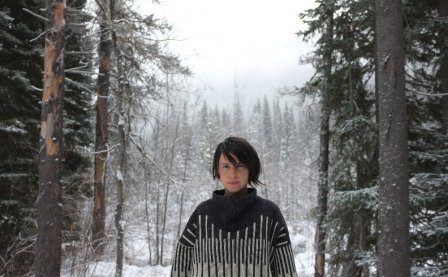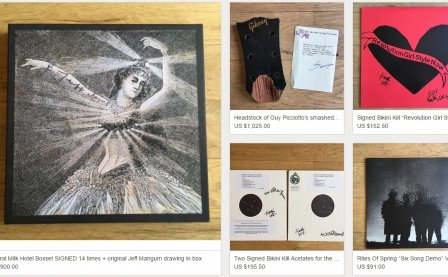Linguists after a few drinks agree: French lyrics and poetry are a bitch to translate. It comes off a tad anal. Before you know it, an entire nation of English majors is missing Derrida’s sense of humor. The booklet for Courses contains dutiful translations, but a quick glance reveals the English is too clunky and analytical to rely upon, and moreover, the person who wrote them doesn’t believe translation is crucial to her art. My bet is, like most songwriters in any language, Québécois Geneviève Castrée is more concerned with formants, those lip-generated frequencies like “wah” and “oh.” To the architectural musician, formants are just another palette like timbre, time signature, or tone from which to construct a sort of melody. Hence, the “unmeaning” pleasures of rhyme. In the case of Courses, you’d be hard-pressed to find words in any language that tell a story as gripping as its formants.
Castrée is bored by the English language, but it’s safe to assume she’s still trying to communicate something to us via this moniker shift. Courses could have singlehandedly blown Woelv’s past discography out of the water; instead, for psychological rather than commercial reasons, Castrée is now Ô Paon. Darker, she says? Okay, sure. Husband Phil Elverum supplanted by GY!BE bassist Thierry Amar at the masterfade? Important, but not the way you’re thinking. Revamped recording process? Bingo. Castrée has become a disciple of the Looping Pedal, which is more of a philosophy than a tool. In so doing, she has joined a movement that believes even sub-120-BPM music should be constructed with the additive, repetitive, waveform-on-your-sleeve frankness of electronic music. Castrée’s work can no longer effectively explore themes of wanderlust and naïveté; looping pedals document routines, grim certainties, obsessions. Take “Chevaux,” which with its broad piano chords and somber violin is in many ways the most stucco-folk song here: Castrée’s melody is pretty, but there’s an ache to the slavish repetition, like she’s singing the song in solitude to keep herself from crying. The preceding tracks whiten listeners’ knuckles less subtly.
Here’s what sets Ô Paon apart from contemporaries: Castrée knows that not all repetition is created equal. Her voice loops for atmosphere, but it will also bushwhack a harrowing journey if it helps the narrative. You’d never mistake her for some faceless LCD-glazed loop-twiddler. Courses’ surgical centerpiece “Aéroport/Évolution” is its longest and boldest song. She doesn’t hit the stratospheric chorus — and, of course, “chorus” is nominal because everything’s built around the same guitar part — until almost halfway through the song, and for the third time in a row, her brave, brittle voice cracks. It’s one of the most affecting moments on the album. She’s still shaking when she spelunks back into the verse’s lower octave, and she should be: if the machines regurgitated a loop instead, Castrée the narrator would be elastic and unharmed. Woelv was tentative and fragile by design, but Ô Paon gives her weaknesses corners to peer around. In “La Plus Puissante du Monde,” something chloroforms her when she gets too worked up (“aaaaaaaaaah-ap!”), and during a similar moment in “Raffinerie,” a cutting ray of feedback silences her.
Amar does an excellent job letting these songs breathe. When he’s on, the songs barely come off as more than guitar and voice, even if there’s an organ cultivating some clandestine dread and loneliness. His fingerprints are most blotchy — and welcome — on the opener “Le Dernier Mot.” Courses is full of memorable songs, but this endless spiral staircase of a song is the one that’ll worm through your day-to-day. Molten tremolo throttles the trailing guitars, Castrée’s vocals double into eerie quarter-step intervals, and heavy, funerary percussion marches on and on. The song is aesthetically distinctive, but marked mostly by its horizontal space; the vocal lines are separated by huge, plodding chasms. Castrée’s longer songs are her most successful, and though I sometimes wish she’d gone for Broughton, she peppers tuba, violin, and organ a little more furiously in the second half’s generally shorter songs. Closer “Les Perdants/Les Perdantes,” which dons an earthy baritone guitar, is a fragment almost to the point of fakeout — it could easily have unfurled into a song the length of “Le Dernier Mot” — but as a surprising coda does a lot to point to the album’s swathe.
Now that Geneviève Castrée’s a loop fiend, I’m inclined to believe she won’t be able to go back (at least not without significant changes to her songwriting). Whether she takes a different name for her upcoming work might well be a therapeutic issue, and whether she sees room to grow within the Ô Paon approach is unclear. But that’s the best part: Courses succeeds because it simultaneously sounds like a one-shot deal and corkscrews well below the skin. Its fans’ morbid, masochistic fascination with whether she’ll keep turning that corkscrew might know no satisfaction, but for 40-odd minutes, playing the record again feels as cumulative as most can take.
More about: Ô Paon




